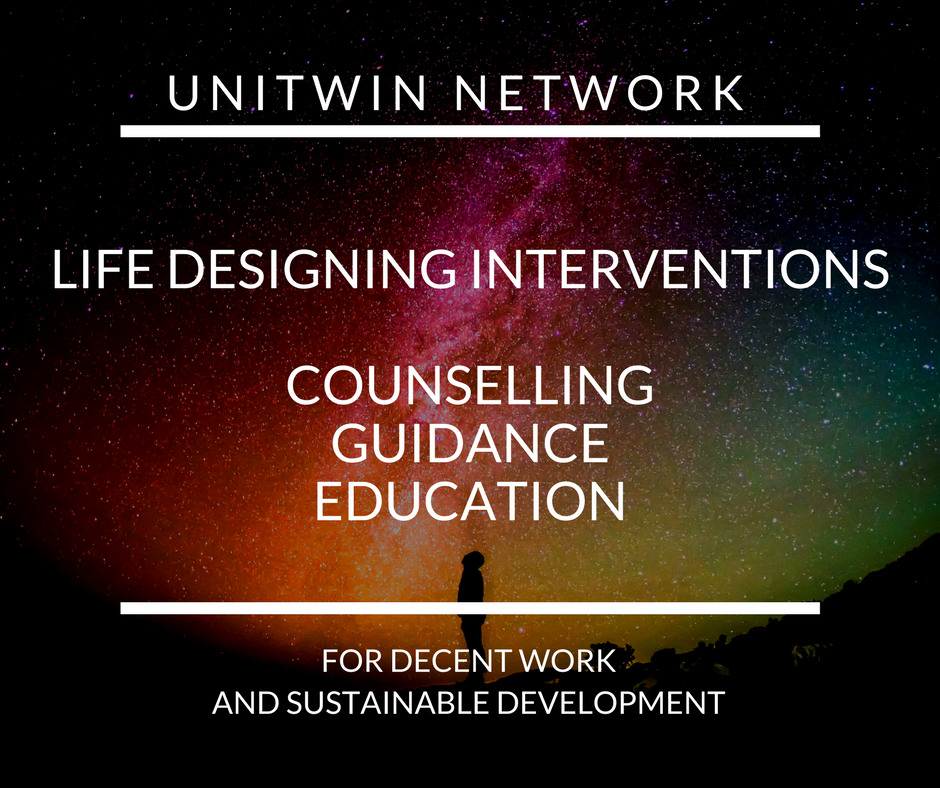UNITWIN NETWORK Life Designing Interventions
In 2017, the UNITWIN NETWORK Life Designing Interventions (counselling, guidance, education) for decent work and sustainable development was built around the UNESCO Chair.

In the last decades, our world has undergone many transformations. In the current social, economic and cultural context, work organization systems are different from the last century. Globalization was induced a destandardization of career paths, requiring more transitions across vocational and career path. These changes have the tendency to increase peoples’ insecurity, which increases the need for vocational training, career counseling, lifelong learning and life design interventions. Moreover, vocational psychology aimed, from the beginning, to favor access to decent work and decent life. In this context, the issues of work-life balance and well-being promotion are very important factors to consider when studying career identity construction. Regarding the positive effects of decent work, it is important to explore resources and barriers that impact its access.
Life designing is a general framework for interventions supporting “individualized individuals” of contemporary “liquid societies” in their active life’s directing. Today’s deleterious global crisis (which some aptly call the “Capitalocene crisis”) has led to this general framework being completed by emphasizing that such “designing” of individual active lives can be viable in the short or medium term, only if everyone (individuals and collectives) introduced within their reflections the fundamental imperative summed up by Hans Jonas’ “Imperative of Responsibility” (1984, p.37): “Act so that the effects of your action are compatible with the permanence of genuine human life”. An imperative whose correlate in the field of support to the active life’s construction is the principle of responsible designing of active life. The UNESCO Chair and UNITWIN NETWORK have outlined supporting interventions concretizing this principle (in referring to the sustainable development goals of the UN 2030 agenda, the decent work imperatives of the ILO and by articulating concepts (forms of life, active life, capability, action model, etc.) operationalizing this general framework.
These interventions aim to help individuals and collectives find their answers to the following question: What direction and form should I (should we) give to my (our) active life(ves) so that the form of life of each human being be economically (ecologically) sustainable and humanly equitable?
In this context, the UNITWIN NETWORK promotes global cooperation between universities on lifelong guidance and counseling to support decent work and sustainable development.
This UNITWIN international cooperating network brings together 23 universities from around the world. This scientific cooperation will allow developmental research and programs which promote lifelong learning opportunities and improve vocational counseling for all. This cooperation will also create programs to promote social inclusion by providing adapted intervention for disadvantaged, marginalized, underserved and underrepresented groups.
The scientific director of the network is currently: Prof. Sanna Vehviläinen (University of Helsinki, Tampere and Eastern Finland and School of Educational Sciences and Psychology, University of Eastern Finland).
In 2018 – 2021 – the role was held by: Prof. Jérôme Rossier (University of Lausanne, Switzerland).
In 2021 – 2022 – Prof. Valérie Cohen-Scali (INETOP-CNAM, Paris, France) and Prof. Sanna Vehviläinen (University of Eastern Finland).
Since the beginning, the work of the Network has been coordinated by the University of Wrocław
Coordinators: Dr Violetta Drabik-Podgórna and Dr Marek Podgórny (Institute of Pedagogy, University of Wrocław)
